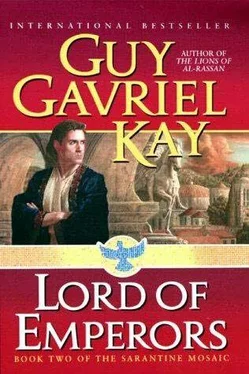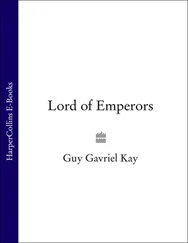He took the rose with him (wrapped and concealed) when he and his family eventually sailed, a very long way west to a land where such objects of uttermost craft and art were, as yet, unknown.
It was a place where competent physicians were urgently needed, and could rise swiftly in a society that was in the process of defining itself. His unusual domestic arrangements were tolerated on that far frontier, but he was advised, early, to change his faith. He did so, adopting the god of the sun in the manner that Jad was worshipped in Esperana. He had responsibilities, after all: two wives, two children (then a third and then a fourth, both boys, not long after they settled), and four former soldiers from the east who had changed their lives to come with them. Two of their new household women from Sarantium had, unexpectedly, also taken ship with his family. And he had an eldest child, a son, who was best made to appear-they all understood this-to fit in, as much as could be, lest he be singled out and danger come to him thereby.
One bent sometimes, thought Rustem, so as not to be broken by the winds of the world, whether of desert or sea or these wide, rolling grasslands in the farthest west.
All of his children and one of his wives turned out to like horses, very much. His longtime soldier friend Vinaszh-who married and had a family of his own but continued to entwine his destiny with theirs- turned out to have an eye for choosing and breeding them. He was a good businessman. So was Rustem, to his own surprise. He ended his days in comfort, a rancher as much as a doctor.
He gave the rose to his daughter when she married.
He kept the note, though, all his life.
He had known the last days here would be difficult, he hadn't fully grasped just how much so. For one thing, from the time he came down from the dome the second time, late at night, after returning from the Imperial wedding in the palace and working by lantern-light to finish an image of his daughters that would be torn down almost as soon as it had set, Crispin had spent very little time entirely sober.
He wasn't enamoured of the image of himself as someone who drank to blur pain, but he didn't seem able to do much about it, either.
One of the hardest things was the outrage of other people. It enveloped him. For a private man that was difficult. Well-meaning, wildly passionate friends (he had more than he'd realized here, one never really stopped to count), cursing the new Emperor, offering wine in their homes or taverns. Or late at night in the kitchen of the Blues" compound, where Strumosus of Amoria held forth with articulate savagery on barbarism and the presence of it in a civilized place.
Crispin had gone there to see Scortius, but the charioteer had been asleep, medicated, and he had ended up in the kitchen taking a meal long after dark. He didn't get back to the compound again until just before departing. Scortius was sleeping that time, too. He chatted briefly with the Bassanid physician, the one whose name and address Zoticus had given him before the man was even in Sarantium. He was past the point of trying to sort that through, as well: there were simply things in the world he would never understand, and they didn't all have to do with the doctrines of holy faith.
He finally caught up with Scortius to say goodbye later that same evening. There was a crowd in the man's chambers-a routine circumstance, it appeared. It made that parting casual, which was easier.
He found that too much of the passion of others expended in sympathy for him was both wearying and humiliating. People had died here. People were dying all the time. Crispin had had a commission withdrawn, his work found unsatisfactory. It happened.
He tried to make himself see it this way, at any rate, to advise others to perceive it as such. He didn't succeed.
Shirin, when he called on her and said these things, declared him soulless (he made no witty comment about her choice of words, it wasn't the time for that) and an outright liar, and then she stormed out of her own sitting room, tears on her cheeks. Danis, the bird, from around her throat in the hallway as they left, declared silently that he was a fool, unworthy of his own gifts. Of any gifts.
Whatever that meant.
She didn't even come back to see him out. One of the household women walked him to the door and closed it behind him.
Artibasos, the next afternoon, serving a good Candarian, well watered, with olives and fresh bread and olive oil, reacted differently.
"Stop!" he cried, as Crispin tried the same explanation about commissions being ended or withdrawn. "You shame me!"
Crispin fell obediently silent, looking down at the dark wine in his cup.
"You don't believe any of what you say. You are only saying it to make me feel better." The little architect's hair was standing straight up, giving him the unsettling look of a man who'd just been terrified by a daemon.
"Not entirely," Crispin said. He remembered Valerius smoothing down that hair, the night he'd taken Crispin to see the dome that was his gift.
Unworthy of any gifts.
He took a breath. "Not just for you. I'm trying to make myself… to find a way to…"
It wasn't any good. How did you say this aloud, and keep your pride?
For they were profoundly right, all of them. He was lying, or trying to. Sometimes you needed a certain kind of dishonesty, even with yourself, to… carry on. Of course artisans lost commissions. All the time. Patrons didn't pay to keep a project going, remarried and changed their minds, went abroad. Or even died, and their sons or widows had a different idea of what should be done to the ceiling of the family dining room or the bedroom walls of the country estate.
It was true, everything he'd said about that was true, and it was still a lie, in the heart.
His drinking, starting in the morning, every morning, was its own proof of that, if you thought about it. He didn't want to think about it. He looked at the cup Artibasos had poured for him and drained it, held it out for more.
It was a death, what had happened. The heart would cry.
"You will never go back in there, will you?" the little architect had said to him.
Crispin shook his head.
"It is in your mind, isn't it? All of it?"
Crispin had nodded.
"Mine, too," Artibasos had said.
The Emperor went north to Eubulus with his army, but the fleet, under the Strategos of the Navy, did sail, after all. Leontes, now Valerius III, was hardly a man to let such an assembly go to waste. No good general was. The ships, laden with provisions and siege engines and weapons meant for a war in the west, were sent east instead through the Calchas Sea and then north. All the way through the far straits, to anchor near Mihrbor, firmly in Bassanid territory. Enough soldiers went on board to achieve a landing and defend it.
The army going overland, the troops that had been about to sail for Batiara, would be far larger than any force Shirvan had sent to harry the north. It was an army of invasion, this one, long-planned, and the new Emperor intended to use it that way-but in a different direction.
The Bassanids had breached the peace. A mistake, born of a desire to hamper a western invasion and an understanding-accurate enough-of the desires and designs of Valerius II.
Valerius II was dead.
The consequences of the miscalculation were on the Bassanids" own heads.
The soldier Carullus, once of the Fourth Trakesian, then very briefly of the Second Calysian, more recently a member of the Supreme Strategos's own guard, was not in either force, not those who rode and marched or those who sailed.
He was unhappy about this. In the extreme.
The new Emperor continued to have strong views, amounting almost to an element of his well-known piety, about taking newly married men to a theatre of war if there were options and alternatives. With an army of this size, there were.
Читать дальше
Конец ознакомительного отрывка
Купить книгу










